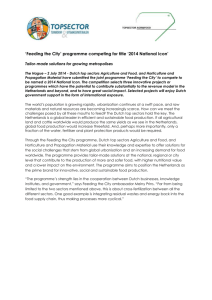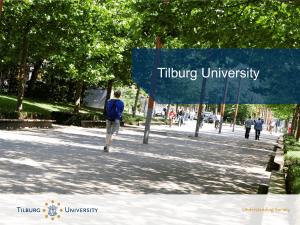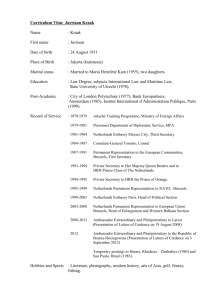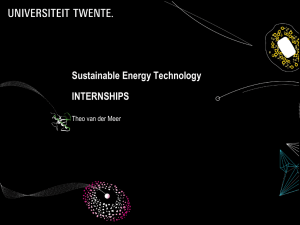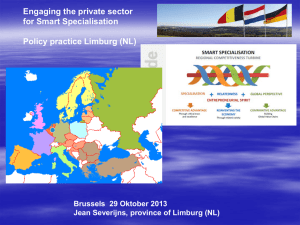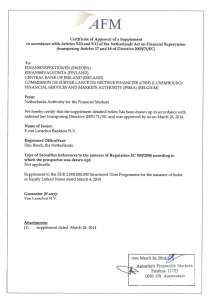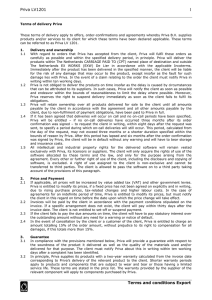My name is Meiny Prins. I am CEO of Priva, a high
advertisement
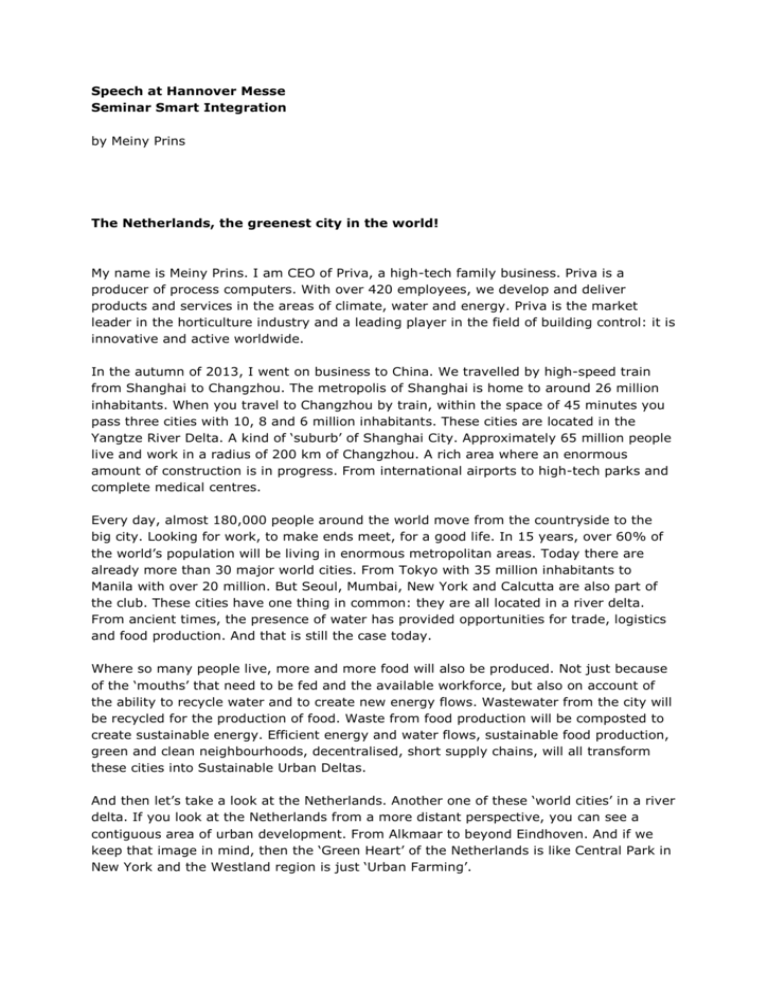
Speech at Hannover Messe Seminar Smart Integration by Meiny Prins The Netherlands, the greenest city in the world! My name is Meiny Prins. I am CEO of Priva, a high-tech family business. Priva is a producer of process computers. With over 420 employees, we develop and deliver products and services in the areas of climate, water and energy. Priva is the market leader in the horticulture industry and a leading player in the field of building control: it is innovative and active worldwide. In the autumn of 2013, I went on business to China. We travelled by high-speed train from Shanghai to Changzhou. The metropolis of Shanghai is home to around 26 million inhabitants. When you travel to Changzhou by train, within the space of 45 minutes you pass three cities with 10, 8 and 6 million inhabitants. These cities are located in the Yangtze River Delta. A kind of ‘suburb’ of Shanghai City. Approximately 65 million people live and work in a radius of 200 km of Changzhou. A rich area where an enormous amount of construction is in progress. From international airports to high-tech parks and complete medical centres. Every day, almost 180,000 people around the world move from the countryside to the big city. Looking for work, to make ends meet, for a good life. In 15 years, over 60% of the world’s population will be living in enormous metropolitan areas. Today there are already more than 30 major world cities. From Tokyo with 35 million inhabitants to Manila with over 20 million. But Seoul, Mumbai, New York and Calcutta are also part of the club. These cities have one thing in common: they are all located in a river delta. From ancient times, the presence of water has provided opportunities for trade, logistics and food production. And that is still the case today. Where so many people live, more and more food will also be produced. Not just because of the ‘mouths’ that need to be fed and the available workforce, but also on account of the ability to recycle water and to create new energy flows. Wastewater from the city will be recycled for the production of food. Waste from food production will be composted to create sustainable energy. Efficient energy and water flows, sustainable food production, green and clean neighbourhoods, decentralised, short supply chains, will all transform these cities into Sustainable Urban Deltas. And then let’s take a look at the Netherlands. Another one of these ‘world cities’ in a river delta. If you look at the Netherlands from a more distant perspective, you can see a contiguous area of urban development. From Alkmaar to beyond Eindhoven. And if we keep that image in mind, then the ‘Green Heart’ of the Netherlands is like Central Park in New York and the Westland region is just ‘Urban Farming’. Thus, within 15 years, 60% of all the people in the world will be living in a city. The cities will also be the main drivers for sustainability and radical innovations, for technological breakthroughs. Local authorities will use their cities as testing grounds for new technology, as long as these technologies can solve their major problems in terms of air quality, sewerage, water, too little green space, mobility and high-quality, locally grown food. Because the inhabitants of their city will be placing demands on their quality of life. Look at Beijing. People do not want any more air pollution, stinking sewers and corruption. Quality of life will become more important than economic growth. In this way, the 19th century was the century of empires. The 20 th century was the century of nation states, and the 21st century will be the century of cities. If you look at The Netherlands from a wider perspective you see an “urbanised delta”. A delta which, given the limits on fossil based energy such as gas, is rapidly developing into a “sustainable urban delta”. Not only for ourselves, but also because of the potential we have to become an example to all the large metropoles around the globe. We can be a showcase for magnificent, efficient and sustainable living and working environments, with smart logistics systems, where all kinds of decentralised energy solutions are used and wastewater from the city is recycled for the production of food, among other things. The Topsector Energy is one of nine sectors where the Dutch economy stands out. I have urged the Dutch government and policy makers to invest in the idea that we develop our densely populated country into this ‘sustainable urban delta’. And in order to do so, that we ensure close collaboration between these nine sectors which form the basis of the Dutch Economy. In this way, the ‘Chemicals’ sector will unite with the ‘Energy’ and ‘Water’ sectors to develop new forms of recycling and new biofuels; ‘Chemicals’ and ‘Horticulture’ will work together on natural raw materials; the ‘Energy’ sector might join with ‘High-tech systems’ to implement smart grids, to work on heating networks and to go full out to create smart energy savings in urban environments; the ‘Creative Industries’ will combine with ‘Horticulture’ and ‘Water’ to develop all kinds of new concepts in connection with Urban Farming and come up with new forms of living and working on the water; ‘High-tech systems’ and ‘Logistics’ will specialise in intelligent networks; the ‘Water’ and ‘Horticulture’ sectors will recycle wastewater from the city for valuable new applications, while ‘Water’ and ‘Energy’ will develop clean inland waterway vessels; the ‘Logistics’ sector will join with ‘High-tech systems’ to develop unique and sustainable transport systems; ‘Life sciences & health’ and ‘High-tech systems’ will come up with solutions to enable the elderly to live independently for longer; ‘Life sciences & health’ and ‘Horticulture’ will invest in preventive healthcare through healthy nutrition, while ‘Horticulture’ and ‘Energy’ will work on energy sources in the greenhouse; ‘Agro’ and ‘Horticulture’ will ensure the increased sustainability, health and taste of food, while developing new, local supply chains. Do you get it? The Netherlands is good at this sort of thing. We are very well positioned to be excellent in a single area: the creation of a future-oriented and socially responsible way of life in a Sustainable Urban Delta. The Netherlands today is very good at adopting an integrated approach, we are very efficient and effective, we are innovative and we are leaders in the field of sustainability. We are a country that derives its main revenues from exporting. It does not matter where you go in the world, you will always meet Dutch people… Mainly because many companies in the Netherlands are market leaders in a particular niche and are therefore internationally very active. And market leadership in the niche markets of today means a key position in the new and sustainable global economy of tomorrow. Today it is a fact – including in the Netherlands – that large movements in the area of sustainability and corporate social responsibility are not instigated by the government, but mainly by the cities themselves, by members of the public and by companies, through organisations such as MVO Nederland. At present, there is still an enormous amount of knowledge and expertise present in the Netherlands. For example, in Australia it is considered a big deal if you invest a lot of money in a low-energy building with a ‘5 star label’. But, according to an Australian professor, that is equivalent to our standard building codes in the Netherlands. We produce, in a sustainable manner, 80 kg of tomatoes per m² per year and use only 4 litres of water per kg, while in many countries barely four kg of tomatoes can be obtained per m², while 80-200 litres of water are required per kg of product. Today we also know that locally grown food is sold within a radius of 700 to 800 kilometres, and that this also applies to the Netherlands. Our largest market for vegetables is ultimately Germany… And that a kind of ‘green belt’ develops around the large metropolises, as in Sao Paulo, where around 1.5 hours’ drive away there is smallscale food production taking place, which with the rise of the middle classes will rapidly turn into professional agricultural and horticulture. Today, there is already a project that takes wastewater from the city and transforms it into quality one water, which is recycled for the production of food and which is called Delft Blue Water. And so I can already name a large number of very practical projects in the Netherlands that are making a direct contribution to living and working in a sustainable city, and I’m sure the Dutch people present today, know of many more. The Netherlands can play a major role in the global changes towards a more sustainable world. Today, the Netherlands can already offer a perspective on a sustainable and socially responsible way of life. Thank you very much.


